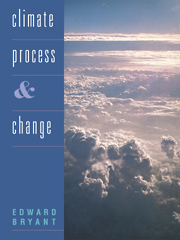4 - The role of oceans
Published online by Cambridge University Press: 05 June 2012
Summary
OCEAN CLIMATE PROCESSES
(Linacre and Hobbs, 1977; Pickard, 1979; Beer, 1983; Tolmazin, 1985)
Ocean circulation is conditioned by the properties of seawater under the effects of changing salinity, density and temperature, and by forcing of atmospheric circulation. In combination, these effects are responsible for the present state of the ocean under the Earth's existing climate. More importantly, these changes in ocean dynamics are responsible for much of the short- and long-term climate change normally attributed to the atmosphere.
Thermal expansion
The density of water is 1,000 kilograms per cubic metre at 4°C. Below this temperature, water becomes less dense and tends to rise to the surface. When it freezes, ice floats. The addition of salt increases the density of water if the temperature is constant. Seawater's density varies between 1,034 and 1,035.4 kilograms per cubic metre over 90% of the ocean (by convention 1,000 is subtracted from this value and these densities are reported as 34–35.4%). Salt lowers the freezing point of water such that ocean water freezes at a temperature of -1.9°C. The maximum temperature that can occur in the open ocean is 30–31°C. Above these values, the loss of heat through latent heat of evaporation balances the addition of heat through absorption of solar radiation. In addition, thick, high-level clouds form as a result of intense convection at these temperatures. This limits incoming solar radiation.
- Type
- Chapter
- Information
- Climate Process and Change , pp. 58 - 74Publisher: Cambridge University PressPrint publication year: 1997
- 1
- Cited by



